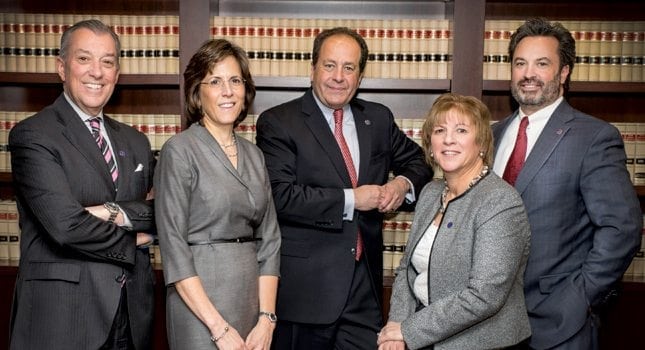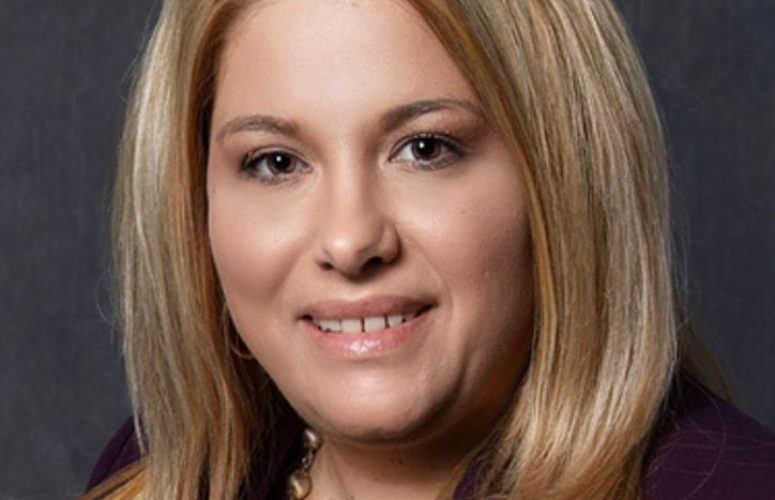
Testimony on the Economic and Legal Landscapes
New Jersey attorneys present their cases on issues vital to business.
By Anthony Birritteri, Editor-in-Chief On Apr 4, 2014In New Jersey Business magazine’s continuing Trade-Talk Roundtable series, we sit down with leading attorneys in the state and executives of the New Jersey State Bar Association to discuss the issues impacting the practice of law and, in turn, business. In the following Q&A, you will see that these are interesting times for lawyers, employers and employees as participants discuss issues such as tort reform, the creation of business courts, the practice of alternative dispute resolution and the economic climate in the state and its impact on the delivery of legal services.
Many thanks go out to the New Jersey State Bar Association for hosting the event at its headquarters, The New Jersey Law Center, in New Brunswick. Special thanks go to Kate Coscarelli, senior director, communications and media relations.
Participants in this roundtable are:





Q: What makes New Jersey an ideal state to practice corporate law?
Suflas: From a corporation standpoint, the state has a highly educated workforce. It is a well-compensated area of the country, and it is a great transportation hub. Those are the reasons why businesses are attracted to New Jersey.
Lamparello: New Jersey is the hub of a lot of activity. People used to think of the state as just being between New York and Philadelphia, but clearly New Jersey is its own entity with a lot of corporations doing business here. This is a prime place to practice law.
Amalfe: I think things are changing for corporate lawyers in New Jersey. I think more and more corporations are looking to state-based law firms for their corporate law needs instead of going to Manhattan and using a big New York-based firm. A large number of New Jersey law firms are getting a good percentage of New Jersey corporate deals. And frankly, the rates are much better in New Jersey compared to the big New York firms.
Suflas: After 2008, corporate legal departments became much more sophisticated purchasers of legal services. One of the things they learned is the quality of lawyering in this state is unequaled around the country … and they don’t have to deal with Manhattan law firms with Manhattan real estate and cost of living rates. Work can be done here with lawyers of unparalleled quality.
Q: Are New Jersey law firms hiring and expanding because of this realization by state-based corporations?
Amalfe: I think there has been smart growth. I think law firms are not just hiring for the sake of hiring, or hiring for the sake of getting bigger. They are hiring in areas where they think there is growth; for example, solar energy. There are law firms that are now hiring people who are experienced practitioners in the area of solar energy because the state is very much in the forefront of the industry. Biotechnology and intellectual property are other areas where law firms are concentrating and hiring.
Suflas: I think law firms are running their businesses much more carefully than they did in the past. In the last 10 years there was hiring for hiring sake – “If you build it, they will come.” That is no longer the case.
Q: Why is NJ such an employee friendly state?
Sulfas: I speak all over the country and I always talk about my beloved home state by saying it is the most employer hostile jurisdiction in America. The judiciary has traditionally been very focused on protecting and expanding the rights of employees. Christine (Amalfe) and I would agree that the judiciary has gone a little bit too far. John (Keefe) would disagree and say they haven’t gone far enough. But from an employment law perspective, that’s the challenge. I have lawyer friends in Georgia and I tell them, “Practicing in Georgia is like being at the beach all summer … all you do is win. In New Jersey, it takes lawyering of a much higher quality level and much higher creativity level given the legal landscape with which we are dealing.
Keefe: I have a slightly different perspective. I think that the notion that New Jersey is this extremely anti-business, pro-plaintiff and pro-employee jurisdiction has swung dramatically these last couple of years. I take exception to the idea that it is easy for a plaintiff to walk into a New Jersey court and have his or her way. I think cases are very difficult to prosecute and seeing them through is very costly for plaintiffs. Courts are not making it overly easy.
Lamparello: Obviously, there are those among us at this roundtable on different sides, but we all do a lot of work. At the end of the day, New Jersey has a sophisticated population. The workforce is very intelligent. It is a great bench, a great Supreme Court and we pride ourselves on being on the cutting edge on a lot of legal issues. Other states look to us because of that. So yes, we have expanded employee rights, but in the same respect, I think most of the cases are decided in a fair manner.
Q: What can you tell me about the New Jersey economy based on the amount and type of business your law firms are getting?
Amalfe: As employment lawyers, what we were seeing back in 2008-2009 were clients calling to say they needed to reduce head count. Then there was a lull, then sort of a second round of reductions. In 2013/2014, I am not seeing a lot of that. On the flip side, I am not seeing a lot of “Write me an employment contract because we are hiring” requests. The budgets are still very tight. Corporations are still deciding if they are right-sized given where the economy is today. You still see terminations occurring, but not on a massive scale. And you still don’t see a lot of hiring to replace those terminations.
Suflas: The other thing that I am seeing from corporate clients is that they are doing much more work in-house. They are trying to manage their outside legal spend. They are doing that by: No. 1, hiring more staff attorneys; and No. 2, going to the web to solve their own problems.
Now, of course, I will say to them, “Pay me now or pay me later.” [Otherwise], they are taking on the risk that maybe they are not analyzing the situation properly. But I think more and more clients, especially mid-sized and smaller businesses, are trying to do their own legal research on the web.
Keefe: From a small law firm operating in Monmouth County, I can tell you that Superstorm Sandy is still impacting the [business and legal] environment. So many small businesses have not opened and many probably will never return. There are people who have returned, but have increased debt loads because they have had to restructure and refinance, or perhaps their insurance was not enough. I can tell you it has affected our law firm. There has not been that quick recovery.
Q: If that is the case, how are law firms fairing in terms of billings and revenues? Are firms being flexible with rates?
Suflas: I am in the New Jersey office of a national law firm with 14 offices and 500 lawyers across the country. We rank No. 100 in the nation in terms of our size. When you look at our competition, the largest firms in America, their performance over the last couple of years has been widely variable. Some have done very well, some have seen modest, but steady growth, some have been flat, and some have had significant problems. It’s all over the lot. The sense I get is that the demand for legal services is static on the corporate end. What that means is that more law firms and lawyers are chasing the same dollar. That forces us to become more creative and aggressive. It forces us to become business people, and I know I didn’t go to law school to become a business person, but that is how it turned out.
Amalfe: I come from a large regional New Jersey-based law firm. I think we have had and continue to have very good years, but I think this is because we have been very smart in how we have managed our expenses. There is no doubt that the demand for legal work is there, but there are more lawyers looking to do it. So … the work we used to do at higher rates is now being pushed down to lower rates. In addition, from a revenue point of view, it takes longer to get paid. Clients who used to pay in 60 days, pay in 90, and those who paid you in 90 are now paying in 120.
Q: Are there now too many attorneys, then?
Lamparello: The big statistic is, and the American Bar Association published this, a full 45 percent of new lawyers coming out of law school are not getting jobs in the first nine months. In the past, people got jobs. That number is out of control. That tells you, you’ve invested $200,000 plus [for a legal education] for no reason. You can’t get a job in the field in which you thought you’d get a job. That’s the crisis. Are there too many lawyers? That is the public perception. Not all people who go to law school practice law, because it is also a stepping stone to other things. Clearly, the legal jobs are not out there.
Amalfe: A lot of students coming out of law school, because they can’t find a job, will start their own practice. However, they are not really trained because they have not worked at a firm. You have them starting up solo practices and not really being successful. Four to five years out, they are still struggling. They have overhead to pay, they have to pay for secretarial help, they need computers, they need insurance … and they need to generate business.
Suflas: One of the effects from this is some questionable professionalism and questionable competence among these [start-up firms]. Sometimes you see them take cases that no sane lawyer would take because they have nothing else to do. It is a challenge for the entire profession on how to better integrate these people because we are all concerned about our profession. Anything we can do to help them is for the collective good.
I think the State Bar Association has done a lot in the way of outreach to solo practitioners and new lawyers to try and give them the resources they need so they are not out there by themselves.
Keefe: Additionally, it is almost financial suicide to not think about the merits of a contingency case early on. I think it is important and most New Jersey firms that do contingency work are much more careful about making sure a case can survive a merit analysis. Speaking to lot of adversaries, they are not defending as much volume, and I think that is a good thing. What we are trying to do at our firm is bring in good quality and meritorious cases, because there is not a whole lot of financial upside in prosecuting cases on a hope and a prayer.
Q: What are your thoughts on the status of judicial independence in the state?
Lamparello: We are one of four states that has the federal model of a judiciary. That is something we pride ourselves on. All we want is fairness. An independent judiciary is the lynch pin of our government. This is not new – Alexander Hamilton was saying this in 1787 when he argued to get rid of the Articles of Confederation and create a US Constitution. Though elections have consequences, the consequences cannot be the ruin of this independent judiciary. We are playing with the very foundation of our government. There is nothing more important than this to the State Bar Association.
Suflas: The effect has been dead-locking the judiciary. There are vacancies all over the state. Members of both parties can’t agree to move judicial nominations through the process. So moving cases is a problem. You have to have judges to move cases.
Keefe: It is holding up all cases. A business needs an issue resolved no matter what the effect of the litigation is. It applies to anyone seeking justice.
Lamparello: This is not a pro-business or anti-business matter. Businesses are more concerned about having their matters resolved quickly, timely and efficiently. We all want a fair ball game.
Keefe: We also don’t know the effect of the nomination issue on the trial judge who does not yet have tenure. How does that affect his or her thought process when they take on difficult cases and issues? One of the greatest things about the New Jersey judiciary is that it is not an elected judiciary. Theoretically, this is all based on merit.
Q: What are your thoughts on the creation of a business court?
Suflas: Business courts are a good idea. One of the unique things about the New Jersey judiciary is that judges rotate through the different specialties. They will sit in criminal court for a couple of years, then sit in family or civil court, for example. My concern in practicing business litigation is that all of a sudden you end up with a judge who has spent two years in criminal court, two years in family, and now has an employment case. That judge will be challenged because he or she doesn’t have experience in [business].
Lamparello: The Bar Association is in favor of business courts because we want a judge who has the expertise to deal with the issues and not learn the law. That being said, the Chief Justice of the State Supreme Court has asked us to put our position in abeyance right now because he is coming back with a proposal in which he thinks he can tend to the needs of the business community … the needs being litigating promptly, efficiently and getting a resolution to disputes.
Q: What are your views on the need for tort reform?
Lamparello: Don’t confuse tort reform with propaganda. I can give you the perfect example: The hot McDonald’s coffee case. How can this woman, who spilled coffee on her lap, get so much money? When you look behind the facts, and there was a documentary on this, McDonald’s was warned a dozen times about the temperature of its coffee, and it was ignored. The documents were there … and that woman had significant burns and scar tissue.
The jurors who awarded punitive damages looked at what McDonald’s coffee sales were for one day. That was the number they equated for the damages. So we had intelligent jurors wanting to do the right thing. The tort reformers, however, took that case, and the propaganda started.
I don’t think lawyers are anti-business. Even lawyers doing plaintiffs work, you don’t want to knock businesses. You are just trying to compensate people for what their damages are. When you think of how many things exist today because lawyers fought for them … when trucks back up, there is a sound they make, it’s because lawyers fought for that sound so that people wouldn’t get killed.
Keefe: Is tort reform needed? That almost implies there hasn’t been tort reform over the last 20 years. I think there is a notion that there needs to be more, but you need to hit the pause button and look at some facts. There are far fewer cases being filed in our state courts today than there were three years or five years ago.
New Jersey is not an anti-business or anti-insurance state. I think there has been reform. There are trends and pendulum swings and there has been a fair amount of tort reform that has been effective. It has weeded out some bad stuff.
Q: How popular is Alternative Dispute Resolution today in settling business legal affairs? Are more cases going the ADR route?
Suflas: The answer is “yes” for a number of reasons. This goes back to the point I made earlier. If the judicial branch cannot move the cases quickly, parties still need to resolve their disputes. They need to put their affairs in order and move on with their lives. In terms of corporate business litigation (big ticket litigation), high level sophisticated ADR is something that is looked at almost every day. In my practice, it is looked at early on in the process before the parties have expended any legal fees.
Keefe: ADR is a very evolving industry and if lawyers have good relationships with their clients and understand what it means to contain transaction costs, I think they can be very creative with their adversaries in what they do with ADR. What I have seen, as a plaintiff’s lawyer, are defense attorneys approaching me saying they know they have a problem, and they say, “How do we get on top of this? What can we explore?” That is a defense lawyer who is forward thinking about how to contain costs and how to manage risk. Usually, the ADR process is a quicker and cheaper mechanism to resolve disputes.
Lamparello: For a business, ADR is a no brainer. Any business that is involved in a dispute should try to go the ADR way, no matter what the dispute is. At the end of the day, nothing good happens in litigation except spending money on lawyers. Which is good for lawyers, but most good lawyers would say they don’t want their clients to spend money on litigation. Instead, spend money on me to do business deals and contracts.
Amalfe: I think many businesses now are entering arbitration agreements with their employees. It keeps the disputes between the employer and employee out of court. It maintains confidentiality of the issues, and gets a quicker resolution. In addition, corporations who enter deals with other corporations are working arbitration provisions into those agreements. So, if a deal goes bad between two businesses, rather than going to fight it out in court, we agree up front that we mediate first, and if that doesn’t work, we are going to arbitrate. I think those agreements are becoming more and more commonplace.
Keefe: As a plaintiff/consumer-oriented lawyer, the best thing about our judicial system is our juried trial system. We can never lose sight of the fact that people have legitimate disputes. If voluntary ADR does not work, then our society and our court system has to be able to give the smallest and most poorly financed litigant the opportunity to take the case to a jury of their peers. We can’t lose sight of that.
Q: In recent years, we have seen the growth of national law firms with many NJ practices being acquired or doing the acquiring. If I were the owner of a small business, what would be the benefits or the downsides in asking these larger firms to represent me? Would I get personal service?
Suflas: We are one of the larger firms in the country. What you get in hiring a large firm is a reservoir of expertise, which, at the end of the day, is more efficient. My rate may be higher than someone else’s, but given my experience or someone else’s experience, the problems get solved in an hour instead of a week … and the transactional costs end up being significantly lower.
Amalfe: I think companies are also taking the retention of lawyers on a case by case basis … they are not going to the large firm for everything. There are cases where it makes perfect sense to go to a large national or regional firm for the expertise that you might not get from a small firm, say, in Cumberland County. On the other hand, there may be a case pending in Cumberland County in which it makes sense to hire the local lawyer – who has an office across the street from the court house, who knows the judges and their specific likes and dislikes – to handle the case for the small firm.
Q: What are some of the pitfalls employers should be mindful of to avoid audits by the NJ Department of Labor?
Suflas: Besides the obvious, such as paying the minimum wage and treating your people well, the biggest issue is misclassification of independent contractors as employees. That is an area where even the largest and most sophisticated employers frequently get into trouble because it is a complicated area of the law. There is no uniform legal standard to define employee status versus independent contractor status. It varies, literally, statute by statute. And many companies simply take an inappropriately superficial analysis and say, “I will give you a check once a month and give you a 1099. You are an independent contractor.”
Amalfe: I think the mid-sized companies just don’t have the manpower to really understand what each and every employee is doing. Someone may be called a manager, but they may have certain duties on a job description that is 15 years old and they may not do half of those duties anymore. They may be inappropriately classified.
Q: What is your overall advice on how employers can stay out of the courtroom?
Lamparello: The golden rule is to treat others as you want to be treated. Avoid those things you think are business deals, but ethically and morally, are not being done the right way. Treat your employees fairly, communicate with them and pay your taxes.
We should all treat each other civilly and professionally … that will keep us out of court.
Suflas: Not to be crass, but I said it before, pay your lawyer now or pay a lawyer later. Consult with your lawyer at the front end.
Amalfe: Employers have to be proactive. They have to think about: Are their policies up to date; are they complying with regulations? If they don’t know the answer, they need to call a lawyer to find out. These are questions that can be answered in a 10-minute phone call. It saves sometimes millions of dollars down the road. I also encourage all of my clients to do training. Training allows your managers a better understanding of how to treat people civilly, professionally and consistently within the law.
Q: How does the Bar Association emphasize professionalism in the field?
Scheck: I think the Bar Association creates an environment where lawyers come together and network. That creates collegiality … people get to know one another. It is much more difficult to be unprofessional with people you know. Participation in the Bar, in and of itself, creates a level of professionalism that people replicate. We also have a Commission on Professionalism, which does significant amounts of work in continuing legal education (CLE): continuing education for lawyers, judges and the legal community on what it means to be a professional lawyer.
Lamparello: That’s the beauty of practicing in New Jersey, the lawyers are collegial. It’s a small Bar, but with a lot of lawyers. If you practice in New York or Philadelphia you get lost and it’s people attacking one another. Now, you won’t see a Jersey lawyer backing down, that is what we are all about, but you are also going to see us do things the right way.
Related Articles:





